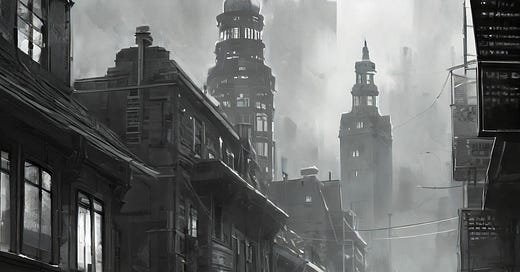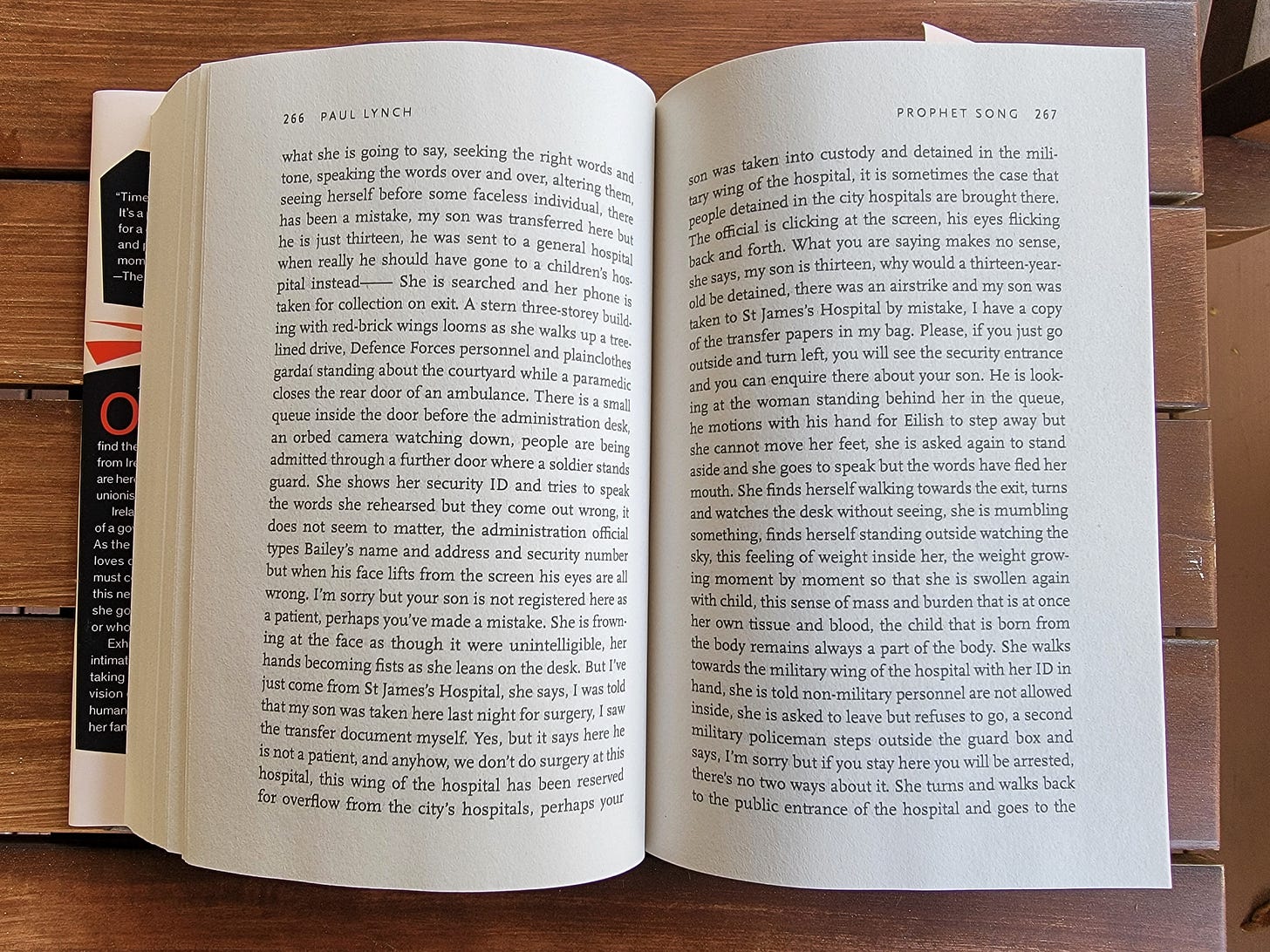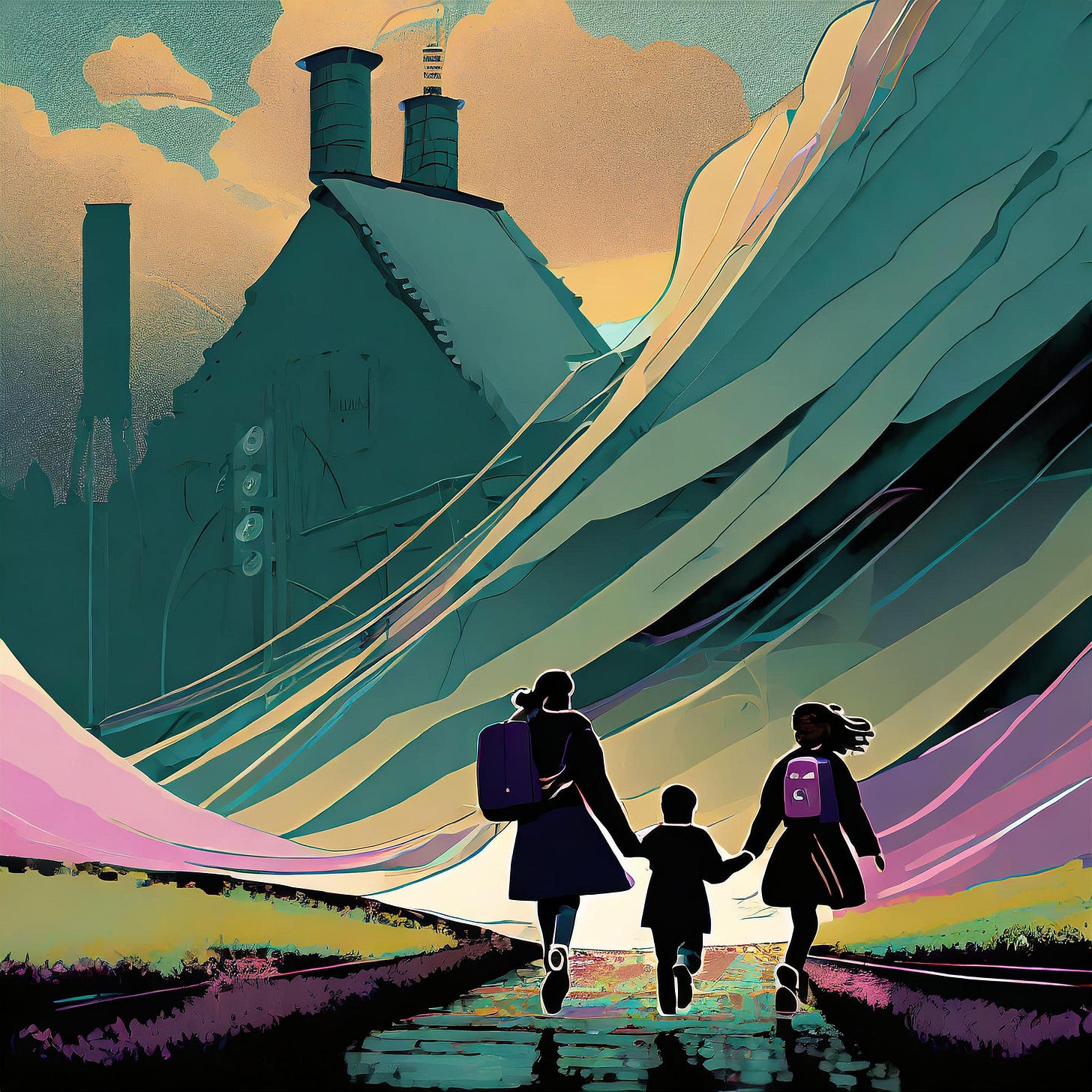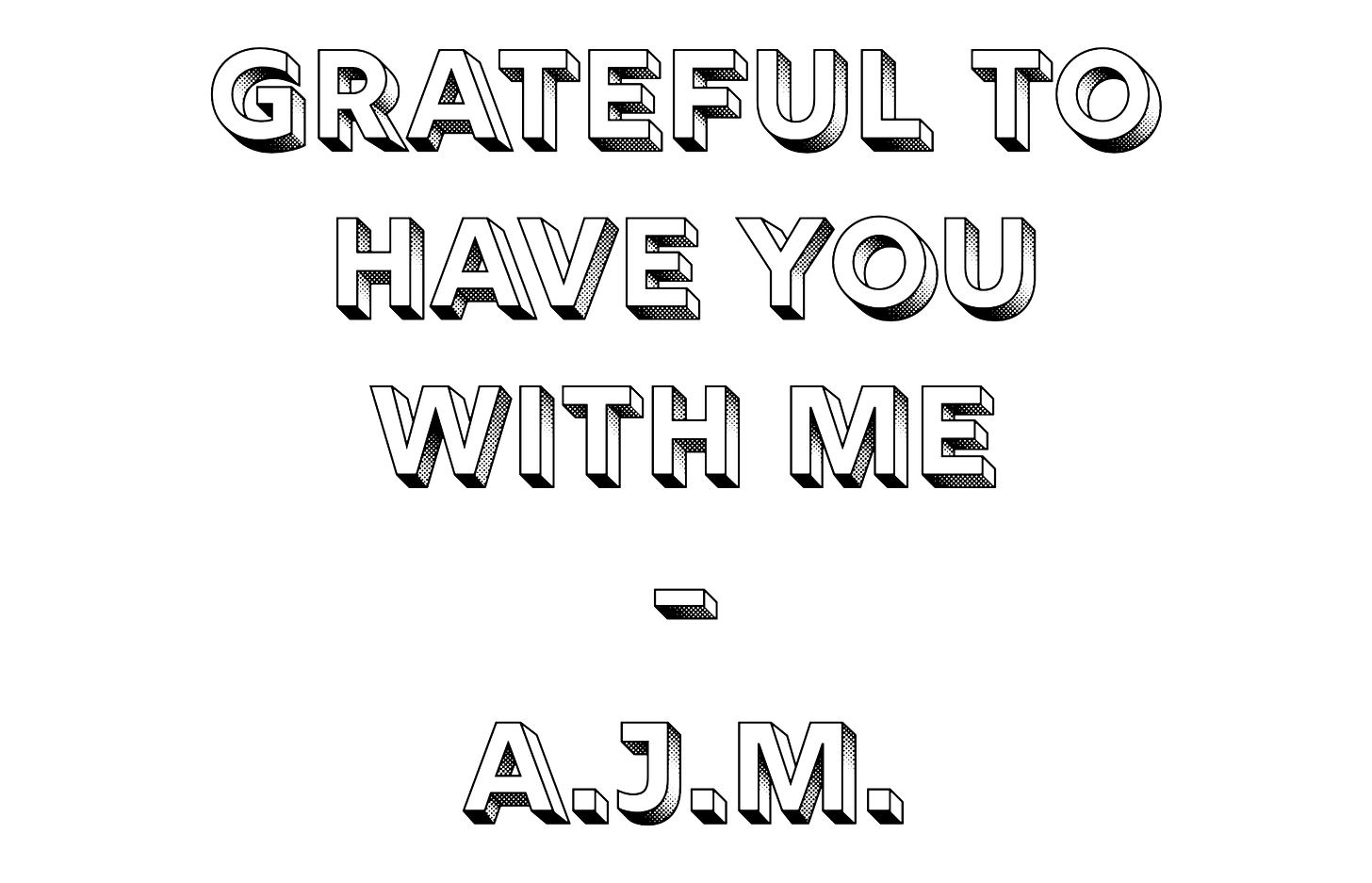Prophet Song—The Booker Prize Winner of 2023
This novel succeeds in dragging the reader—day by day by day—alongside Eilish Stack and her family, through a corroding, war-ridden Dublin.
We agonize at the choices Eilish makes that we do not agree with, but we are always there with her, by her side, knowing she is doing her very best, as we ache for her family to keep on living, and eventually escape the hell that descends upon them.
But what I want to talk about most here is the power of form.
Paul Lynch takes what on the surface is a simple approach to format and creates a 309 page novel in one long unbroken stretch, a chain.
Ok, it isn’t entirely unbroken; it’s a lightly glitched chain. There are starts and stops. There are even 9 numbered chapters.
But much of the novel looks like this:
The prose has no real paragraphs. The dialogue blends into the narrative. The speakers, when they do speak, jump back and forth almost unknowingly to the reader—there are no quotation marks.
Its kind of like, wait, who just said that line? No time to trifle over that really, keep reading—things are moving far too fast, this world is spinning too quickly out of control, keep moving forward.
And this is why this whole thing—the form—is deeply affective.
I am a slow and tedious reader. Taking down a novel of any size is a commitment for me.
Perhaps the ADHD mind, or in today’s world, the dopamine addicted mind, (for more on this, read this brilliant article titled The State of Culture, 2024 by
) is normally presented with bouts of satisfaction, through rests and rewards.Or rather the sense of reward when you finish a paragraph and start a new one. Although subtle, this novel taught me, there is a satisfaction as a reader in reaching the end of a paragraph and beginning a new one.
White space on a page is like a breath of fresh air. Graphic designers and artists know this. Poets know this.
But here, inside Prophet Song, there is no breath. And the effect is absolutely right on target for an anxiety ridden, dystopian story that follows a family in distress as their home and country journey towards collapse.
Try this single sentence on for size:
~
The news comes on and she turns it off shaking with rage, thinking, this is not the news, this is not the news at all, the news is the civilian watching the soldier outside her home as he lolls on a sandbag playing with his phone, the news is the assault rifle resting against the sandbag, it is the soldier’s laughing mouth, it is the fast-food wrappers and coffee cups strewn about the asphalt, it is the retired couple from up the street who have decided that they want to go, the news is their quarrel in the driveway, it is the woman flapping her hands about what cannot be taken in the car, it is the husband who shuts his face to his wife, it is the black bag the woman holds in her arms like a child, it is what is inside the bag, the news is the entire contents of the car, it is the boot the man has to sit closed, the news is the driveway gated for the last time, the house dark at night, it is the traffic light stuck on red for a week before it goes dark, it is the car that will not be allowed through the checkpoint, the news is the shrinking air on the streets, it is the shuttered shops, the windows ply-boarded, it is the hoarse dogs woofing throughout the night, it is the eldest son who does not call anymore because it’s too risky to call and nobody knows if he is dead or alive.
~
That’s one hell of a sentence. Lynch sure does gives Faulkner a run-on for his money.
This is mostly a story about a mother’s love: her instinct to survive, and her difficulty of letting go of an old dying world for something new and unfamiliar.
Each day, the external world around her grows more corrupt, more dangerous; each day she keeps moving forward: her children by her side.
Although it is not that simple: things go wrong. Very wrong. And then things keep going wrong. And then they go even more wrong.
This is a narrative about an Ireland that is not real-life Ireland. Yet it is a story about any real-life, war torn street—an ode to those who in history have suffered under brutal regimes, but also to those current day humans fighting each day for survival.
It explores the tragedy of wartime, and also hints at the difficult path of a modern day refugee fleeing from a dark world, heading for a brighter one. And the difficult and often life-threatening path between these two realities.
~
History is a silent record of people who could not leave, it is a record of those who did not have a choice, you cannot leave when you have nowhere to go and have not the means to go there, you cannot leave when your children cannot get a passport, cannot go when your feet are rooted in the earth and to leave means tearing off your feet.
~
Mark my words, Prophet Song is all but begging to become reimagined on screen as a film. This great story could be a great movie one day.
I wish I counted how many times the word darkness was used throughout. However many times—probably a couple hundred, maybe a thousand—is the right number, for the darkness, it keeps getting darker.
This is a warning story, a loud siren, about any place on earth, any time on earth. Where stability is fragile. Where peace and freedom are precious. It’s about humanity, the rise and fall of humanity. Survival. Love.
Read what
have to say about Prophet Song.Mk.gee— Have you heard this guy play guitar?
I recently read Pitchfork’s review of the debut album by an artist named Mk.gee (his actual name is Mike Gordon).
The album is titled Two Star & the Dream Police, and with comparisons to Prince, Phil Collins, Unknown Mortal Orchestra, D’Angelo and the Police, I had to give it a listen.
My one sentence review: You have to hear this guy play guitar!
Mk.gee, at 26, has been releasing singles and EP’s since 2017 and also played lead guitar for the artist, Dijon (the man, not the mustard).
He has impeccable rhythm, and rather than using a traditional strumming method, he delights in fingerpicking his electric Fender in the most funkily delicious percussive fashion.
If you only watch/hear him play one thing, watch him alongside Dijon in this performance of “Big Mike’s.”
As Pitchfork says, Mk.gee’s single from the new album “Are You Looking Up” could have well been a hit if it was more conventionally recorded, but part of Mk.gee’s charm is what seems to be his devotion to the bedroom pop sound, where it’s difficult to tell if a recording is live, or a studio rendition meant to sound live.
There are in-and-out synths, guitar slaps and scratches, and waves of I-don’t-know-what that practically climb out of the background of the songs on this album—together, adding a texture and ambiguity to Mk.gee’s sound as part of his sonic personality.
Check out “Are you Looking Up” and tell me this guy doesn’t have mad guitar rizz. Fingerpicking a capoed electric Fender Jaguar—come on! What a badass!
Samurai Song—this is my favorite poem
Ok, that comes with a caveat. On most days, this is my favorite poem.
When asked what my favorite poem is, I always land on “Samurai Song.” Sometimes my favorite poem is the poem I just read. But for the sake of defining a favorite—this is it. We’ll look at the poem, and then I’ll tell you why I love it.
Below is a screenshot from The Poetry Foundation.
I first read “Samurai Song” when it was included in The Best American Poetry, 2000. The poem was originally printed in The New Yorker in 1999.
I have probably read this poem 667 times!
I love it for many reasons. To me, the beauty lies in the language, but also the nature of overwhelming courage expressed by the speaker—a disciplined courage that is impenetrable by any mortal force, even by death.
“When I have / Nothing, death will be my fortune”
This speaker can overcome and accept anything. The poem, broken into tercets, is almost like a list of aphorisms.
Clever and philosophical solutions to problems. If this, then this. Where there is a problem, there is a way to solve it. The Samurai way: Bushido, the way of the warrior.
It’s a poem with a moral code of discipline and honor. Along with aphorism, it uses anaphora, but we’ll get to that eventually.
Nevertheless, Pinsky is a poet, and there is an element of added beauty and romance added to these lines:
When I had / No supper my eyes dined.
When I had no / Enemy I opposed my body.
And finally,
When I had / No lover I courted my sleep.
I have shared this poem with others for all kinds of occasions. Usually for graduations, or when someone gets a new job. For me, it’s a perfect pocket poem to pull out to help you along the way as you travel this bumpy, beautiful road called life.
Weekly Word—
This week, we mentioned both aphorism and anaphora. Let’s dig in on these so we can go and impress someone standing in line at the coffee shop tomorrow morning. Just tap the person in front of you and say, “You know what an aphorism is? I do. How bout an anaphora?
Actually don’t do that. You might get in a fight.
Merriam-Webster says:
anaphora—
repetition of a word or expression at the beginning of successive phrases, clauses, sentences, or verses especially for rhetorical or poetic effect
Ex. In “Samurai Song,” this device is the repetitive use of “When I had no …”
aphorism—
a concise statement of a principle
an ingeniously terse style of expression : aphoristic language
Aphorism was originally used in the world of medicine. Credit Hippocrates, the Greek physician regarded as the father of modern medicine, with influencing our use of the word.
















